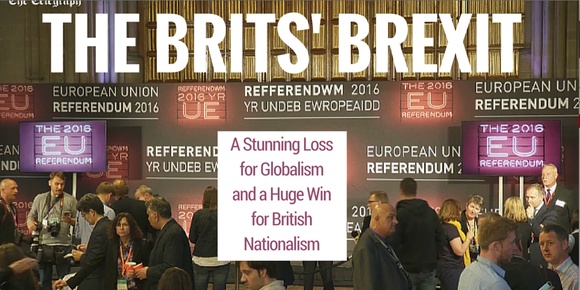
The Vote
ItŌĆÖs official. Or essentially official. Sure, itŌĆÖll be contested and the process and the unfurling of the never-before-used Article 50 (the document governing agreements to leave the European Union) will take a couple of years, but with 100% of the nation reporting, the people of Great Britain have decided ŌĆ£enough is enough.ŌĆØ
With 52% favoring the move, Brits have formally voted to exit the European UnionŌĆöhence the term ŌĆ£Br(itish)exit.ŌĆØ
After two years of speculation and bitter fights that spanned the halls of Parliament, all the way to the shores of Washington D.C., the people have spoken: They want out. No, it wasnŌĆÖt by a landslide, but thatŌĆÖs immaterial. The vote has been won. A simple majority is what is needed and thatŌĆÖs ŌĆ£democracyŌĆØ folks!
US Politicians and the Brexit
Ironically, the U.S. President Barack Obama went to Britain and made the unprecedented, offensive, and publically-rebuked move of trying to drive the British populous to ŌĆ£Remain.ŌĆØ This decision to insert himself into foreign politics led to an uncomfortable and by Chris Grayling, leader of the British House of Commons.
But many Republicans, Libertarians, and nationalistic Democrats were more in favor of the Brexit. Still, even approaching the vote, both Mr. Obama and Democratic Presidential Contender continued to speak against the Brexit, even .
The threats didnŌĆÖt work.
But why?
Nationalism. The Brits chose, albeit by a thin margin, to exit the European Union in favor of Nationalism over Globalism.
NationalismŌĆÖs Bum Rap
Nationalism often gets a bum rap and is sometimes associated, unfortunately, with evils like racism, supremacy, imperialism, and other over-the-top critiques. At its core, Nationalism is about maintaining the integrity of oneŌĆÖs country and its associated society, along with its cultural values, mores and, yes, laws. Without a strong sense of Nationalism, countries inevitably cede ground to external interests that may or may not have that nationŌĆÖs best interests in mind. As a result, non-citizens are afforded rights and entitlements similar to or, in some cases, greater than the citizenry itself. This leads to a disenfranchisement of the people by those outside the sovereign nation who have no ŌĆ£skin in the gameŌĆØ but who are able to influence other nationsŌĆÖ policy and life or lifestyles within other countries.
Brits felt ŌĆ£enough was enough.ŌĆØ The people felt that legal and legitimate citizensŌĆÖ rights were being displaced or otherwise abused by outsiders because of the broken promises of globalization.
Several of the problems within the European Union (EU) were making their way toward the English Channel and, had they crossed over, the damage to the heart and soul of the nation may have rivaled the threats faced in the Battle of Britain decades before.
The problems of the EU are many and storied. Least of all was not the incredible excesses and destruction of the EUŌĆÖs borderless society. Indeed, the influx of now-unprecedented numbers of illegally-entering immigrants from other countries and continents disproportionately and negatively impacted essentially every nation-state they entered. In fact, one can hardly think of any real advantage of this massive migration that has occurred, since itŌĆÖs been established that, percentage-wise, precious few of the immigrants have come to Europe due to genuine refugee considerations in war-torn Syria compared to the opportunistic migrants who traveled for purely economic reasons. One of the problems with this is their exploitation of those nationsŌĆÖ good will toward legitimate refugees in order to bilk the system which, after only a couple of years is unfortunately creating unsustainable economic challenges for even the most wealthy of nations, much less troubled nations like Greece.
GlobalismŌĆÖs Failure
The fundamental issue here is the reason (or reasons) for the Brexit. TheyŌĆÖre all wrapped up in the garb of Globalism. Globalism is essentially an ideology that elevates the interests and status of the world (globe) over the rights and responsibilities of individual nation-states. In this worldview, because the world-globe becomes sovereign, it might be called an ŌĆ£ismŌĆØ or belief system.
Globalism is an offshoot of the many forms and features of globalizationŌĆösome of them good, some of them bad. But fundamentally, globalism is imbibed with a number of enormous assumptions that Brits, and many Americans, consider potential existential threats to national sovereignty and safety. This is because, in globalism, a type of ŌĆ£distorted universal imperialism,ŌĆØ if I may call it, is at play. In other words, the world, as a whole, becomes an imperial power that overrules national interests.
The erroneous assumptions being called out by Brits in The EU Referendum are as follows:
- The Rejection of National Sovereignty. Individual nations have no right to arrogantly claim national sovereignty when their collective wealth and standard of living could be redistributed for the benefit of others.
- The Embrace of Borderless Society. The concept of nation-states as defined geo-political powers is pass├® and should be rejected in favor of a borderless world. This pushes the idea of the dissolution of national boundaries in exchange for a unified global citizenry, a type of one-world system. By the way, if youŌĆÖre sensing potential overtones of the Book of Revelation, you might be onto something.
- The Elevation of Collectivist Economic Theory. Nations should operate more like managers of reallocated opportunity, wealth, and goods with a greater emphasis on the United Nations and similar groups (like the EU) as a new body politic. Call it a Neo-Marxist arrangement where everyone plays nice and shares its wealth with other nations, even ones who have allowed rampant corruption and that failed to harness the collective potential of their people to elevate their society.
- The Era of Global Peace. Globalism posits the triumphalism of a one-world system that erases the concept of Original Sin in favor of Universal Good and Altruism. Theirs is one where we enter an ideal world of peace and non-aggression. One in which the lion lays down with the lamb, but without the need for a returning savior or a millennial kingdom because of the assumption of humanityŌĆÖs essential goodness.
- The Celebration of Global Utopian Socialism. The Brexit has called out, on an international stage, the assumption that the world should (or could) enter a type of thoroughgoing utopian society through essentially Socialist ideology. Never mind that it has never worked without military enforcement and, even when it did, the economic theory supporting it splintered those nations into ruined economies (Cuba, Venezuela) or completely failed states (Soviet Union). Brits are smarter than that, and they proved that once and for all on June 23, 2016.
Now What?
Post-Brexit Challenges for the European Union
The entailments in the UK and the EU will be many and varied.
They will last years and even decades. These will include challenges such as the potential severe weakening of the Euro as a currency (due to the loss of the United KingdomŌĆÖs substantial financial resources), the disproportionate packing of illegal immigrants throughout Europe without the ability to shuttle millions of illegal and undocumented immigrants further westward into England, Wales, Scotland, and Ireland; it need not be said that Ireland could ill-afford it in the first place, with its already-troubled economic system.
WhatŌĆÖs more, the unwillingness of certain groups to integrate into those host societies will continue to cause strain. Not only will the rule of law continue to be disrupted through certain accepted behaviors of some immigrants in those originating cultures (so much for Cultural Relativism), but even greater problems will be in play. Specifically, the problem of Sharia-loving Muslims whose loyalty to Mohammadean Values (the religio-political teachings of Muhammad and modern Islam) will be at odds with the anti-Sharia worldviews of all non-Muslim nations they enter. Add to the mix some small percentage of Islamist extremists (such as those seen recently in Brussels and Paris), and you have a toxic mix of metanarratives that are simply irreconcilable with European values. ThatŌĆÖs a recipe for disaster.
And therein are the problems with the EU as it currently exists.
Closer to Home
Back in the United States, one could think of the Brexit as a novel political story or a nice distraction from American politicsŌĆöa sort of nation-state sideshow.
But it isnŌĆÖt. Ironically, some of the same challenges identified and faced by Britain may be faced, or are being faced, now in the United States. The same themes of Globalism present in the EU are at play here. Many of the issues outlined above are where the current Nationalistic debates in the United States are at least partially rooted. These themes of Globalism are a large part of the national ethos and are sometimes uncritically accepted by those who havenŌĆÖt fully considered the Christian Worldview and its implications.
Your Turn: Sharpen Your Worldview by Considering These Questions
Here are a few questions to consider as you wade through the implications of Globalism seen in 3-D and High Definition throughout Europe:
- What are the Legitimate Interests and Limits of National Sovereignty? Is national sovereignty a bad thing? Where should national interests begin and end? Do leaders of nations have obligations to the citizenry that cannot be said of non-citizens? Why or why not?
- What are the Pros and Cons of a Borderless Society? First, consider the question as it is in the EU. Then consider the United States. In what ways is a borderless society a threat or even an abdication of national responsibilities and the Constitution? Is a borderless society, in todayŌĆÖs world realisticŌĆönot in an idealized world occupied by the Prince of Peace in His Millennial ReignŌĆöbut in a world without a unifying worldview and a collective agreement on truth, ethics, morality, and law?
- What are Challenges with a Collectivist Global Economy? Can we disregard the distinctions, balance sheets, GDP, economic tendencies, debt, trade surplus or deficits, currency value, corruption, and human rights of all nations and simply consider ourselves ŌĆśessential economic equalsŌĆÖ by universalizing the virtues of Acts 2 (giving to everyone as they have need) and extending that hermeneutic to include geo-political bodies that have nothing to do with the people of God and Body of Christ? Are everyone elseŌĆÖs goods, possessions, and fruit of their labor ŌĆ£not theirs?ŌĆØ Has this scenario played out on smaller scales in the past? If so, what was the outcome?
- Is Global Peace a Realistic Possibility? Is global peace the stuff of naivet├® or realism? Is it actually a legitimate possibility or an absurd theological impossibilityŌĆöwithout the Return of Christ? What might threaten the possibility of global peace by people of different worldviewsŌĆöwhether religious or irreligious groups?.Is the Utopian Idea of Global Socialism a Serious Discussion? Where else has this utopian ideal been attempted? What was the result? What examples of collectivism havenŌĆÖt ultimately led to financial ruin or military enforcement? Where have freedoms and the standard of living increased long-term in such societies? And, if truly utopian, what societies have now reached this plateau that we can now point to and emulate?
Christians should be informed and on the forefront of helping others think through issues such as these. Though this is only a brief overview of some of the situations considered by British citizens in the EU Referendum, they are also things that citizens of the United States and Citizen Christians mull over in their minds as we seek to be loyal to our dual obligations to heaven and earth.
 51┬▄└“
51┬▄└“

.jpg)

